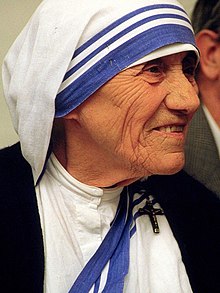Mother Teresa
Mother Teresa (26 August 1910 – 5 September 1997), was an Albanian Roman Catholic nun who started the Missionaries of Charity and won the Nobel Peace Prize in 1979 for her work with people.[2] For over forty years, she took care of needs of those without money, those who were sick, those without parents, and those dying in Calcutta (Kolkata), guided in part by the ideals of Saint Francis of Assisi. She was born in Skopje, Macedonia, and died in Calcutta.
Mother Teresa | |
|---|---|
 Mother Teresa | |
| Born | 26 August 1910 |
| Died | 5 September 1997 (aged 87) |
| Occupation(s) | Roman Catholic nun, humanitarian[1] |
As the Missionaries of Charity grew under Mother's leadership, they expanded their ministry to other countries. By the 1970s she had become internationally well known as an advocate for the poor and helpless, due in part to a movie and book, Something Beautiful for God by Malcolm Muggeridge. She did not think women had the right to have abortions and said "The greatest destroyer of peace is abortion because if a mother can kill her child, what is left for me to kill you and you to kill me?".[3]
Following her death she was beatified (the first stage of sainthood) by Pope John Paul II and given the title Blessed Teresa of Calcutta.[4][5] Mother Teresa was named a Saint on 4 September 2016 by his Holiness Pope at Saint Peter, Vatican. Mother Teresa recieved many awards like the Bharat Ratna in 1980 and Nobel prize in 1979 etc. She is known for serving humanity.
Criticism change
Mother Teresa received criticism over the years, especially in recent years as debate about abortion grew. Christopher Hitchens says that, instead of trying to help the poor, she encouraged them to endure pain and continue to suffer.[6][7] Hitchens also thinks she was against ending poverty and raising the social status of women.[8][9] Hitchens wrote a book on Teresa called The Missionary Position.[10] In an article for Slate, Hitchens writes "Mother Teresa was not a friend of the poor. She was a friend of poverty. She said that suffering was a gift from God".[11]
References change
- ↑ PBS Online Newshour (September 5, 1997).Mother Teresa Dies Archived 2013-10-29 at the Wayback Machine, www.pbs.org. Retrieved August, 2007
- ↑ "Mother Teresa - The Nobel Peace Prize 1979". Nobelprize.org. Retrieved 2009-09-03.
- ↑ "The greatest destroyer of peace..." BrainyQuote. Retrieved 2 June 2012.
- ↑ Associate Press, "Full house for Mother Teresa ceremony" Archived 2004-03-05 at the Wayback Machine October 14, (2003; retrieved from CNN Archived 2013-07-30 at the Wayback Machine on May 30, 2007.
- ↑ "Blessed Mother Teresa," in Encyclopædia Britannica (2007). Retrieved May 30, 2007, from Encyclopædia Britannica Online
- ↑ "Was Mother Teresa Evil? - Good and Evil: Empirical Studies". Evil and Good. Archived from the original on 18 December 2012. Retrieved 2 June 2012.
- ↑ "Was Mother Teresa Evil? - Good and Evil: Empirical Studies". Archived from the original on 2012-12-18. Retrieved 2012-06-02.
- ↑ Hitchens, Christopher (October 20, 2003). "The fanatic, fraudulent Mother Teresa". Slate Magazine. Retrieved 2 June 2012.
- ↑ Swomley, John M. (October 1996). "Exposing Mother Teresa". population-security.org. Retrieved 2 June 2012.
- ↑ Hitchens, Christopher (1995). The Missionary Position: Mother Teresa in theory and practice. Verso. ISBN 9781859840542.
- ↑ Hitchens, Christopher (October 20, 2003). "The fanatic, fraudulent Mother Teresa". Slate Magazine. Retrieved 2 June 2012.
Other websites change
- Mother Teresa of Kolkata information Archived 2014-02-01 at the Wayback Machine (in Spanish)
- Speech On Mother Teresa In English : Nobel Peace Prize Speech